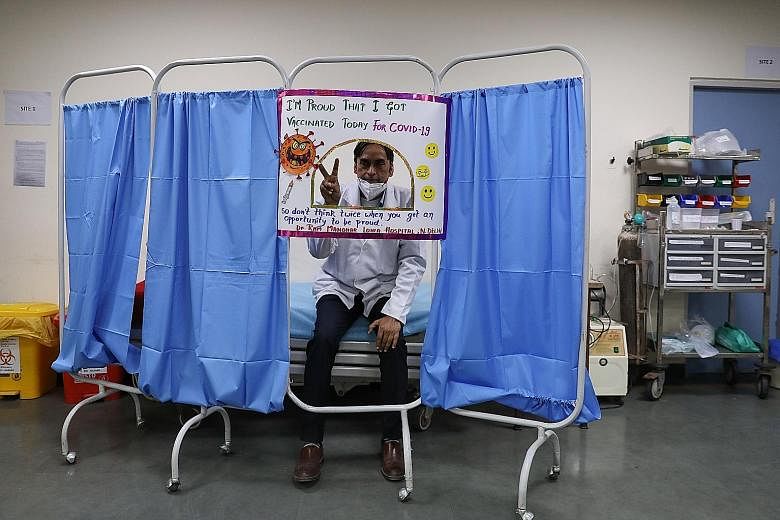Doctors and experts say the Indian government needs to improve its communication on drug safety amid concerns over the speedy approval of vaccines and glitches in a government app, which resulted in only 64 per cent of intended recipients getting their shots on the first two days of India's vaccine roll-out.
The CoWIN app is used by the government to alert recipients when it is their turn to get a shot.
India, which started vaccinations last Saturday, has approved two vaccines for emergency use: Covishield, developed by AstraZeneca and Oxford University, and Covaxin, developed by local firm Bharat Biotech in collaboration with the Indian Council of Medical Research and National Institute of Virology.
But there is a question mark over Covaxin, which is still in phase three trials.
"Covaxin may be better than the others or at least as good, but people want evidence. So, they are saying let us wait and see," said Dr Rajendra Prasad, a senior consultant neurosurgeon and spine surgeon at Delhi's Indraprastha Apollo Hospitals.
A survey by LocalCircles, a citizen survey platform in New Delhi, found that 62 per cent of Indians were willing to wait a few months before getting a jab.
Of those, 59 per cent cited the vaccines' possible side effects as a primary reason, while 18 per cent said it was because the vaccines' effectiveness is not known yet.
Doctors say there is a trust deficit that needs to be addressed.
Dr Partho Bora, president of the Federation of Resident Doctors' Association, said the government should meet doctors to clear their doubts about Covaxin. "If common people get the message from healthcare workers (that the vaccines are not safe), they will follow. All doubt should be cleared (by the government)," said Dr Bora.
India is the second-worst country affected by the pandemic, after the United States, with more than 10.6 million cases reported. On Wednesday, 15,223 new cases were recorded.
But as the country rolls out one of the world's largest vaccination drives, cases have been on a downward trend over the past three months.
The plan is to vaccinate 10 million health workers, followed by 20 million front-line workers, those over 50 and those under 50 who have other illnesses.
The authorities say the vaccines are safe.
Dr V.K. Paul, a member of government policy think-tank Niti Aayog, said at a media conference on Tuesday: "Unfortunate that there is hesitation among healthcare workers towards the Covid vaccine. Healthcare workers should have faith in our system."
Dr Paul, who received the Covaxin shot on the first day, said he had not experienced any side effects so far, and urged doctors and healthcare workers to accept the jabs. He said: "We would like to reassure with the data we have seen, that the two Covid-19 vaccines are safe."
Of the 786,000 people who were vaccinated, none had serious or severe reactions, said the Health Ministry.
Bharat Biotech said those with a weakened immunity, who are on medication that affects the immune system or on blood thinners, or have allergies, should not take the Covaxin jab.
The Serum Institute of India said those who have "had a severe allergic reaction to any ingredient of the vaccine" also should not take it.
The authorities remain positive that as more people get vaccinated, confidence will go up.
Delhi Health Minister Satyendar Jain told reporters: "Going for (the) vaccination is a personal decision, and people's confidence will get boosted slowly."
In the capital city, 3,598 out of 8,136 recipients were vaccinated on Tuesday.

